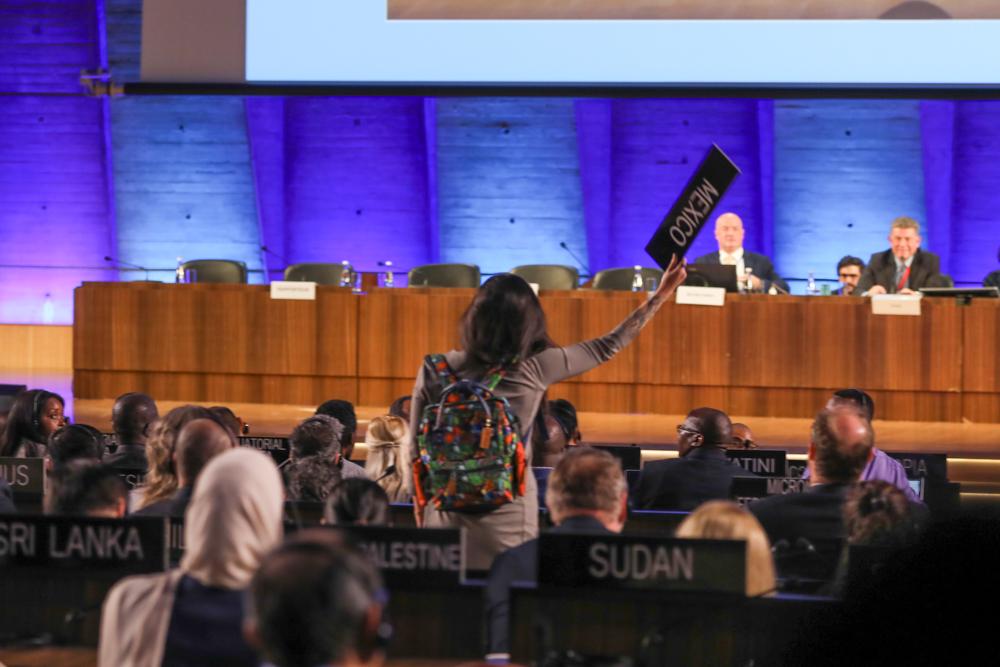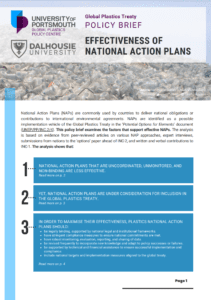Wrapping up the 2nd session of negotiations for a Global Plastics Treaty

Photo by IISD/Earth Negotiations Bulletin
7 July 2023
The 2nd session of the Intergovernmental Negotiating Committee (INC-2) in Paris from 29 May to 2 June, 2023 comprised five days filled with late nights and colourful displays of ambition, frustration, and geopolitics from both member state and observer delegations. As the dust settles, we reflect on the highs and lows of the INC-2.
Achievements of INC-2
Powerful statements were made by the French President, Emmanuel Macron, acknowledging that plastic pollution is a “ticking time bomb”, and by Inger Andersen, the United Nations Under-Secretary-General and Executive Director of UN Environment Programme (UNEP) memorably stating “our linear plastics economy is gushing pollution galore” and “we can’t recycle our way out of this mess”. Despite the slow start, INC-2 witnessed some notable wins in Paris.
1. A functional bureau is in place
INC-2 began with the Chair Gustavo Meza-Cuadra urging delegates to elect a Bureau – a key matter left on the backburner at INC-1. The debate around Bureau membership and the voting process consumed the entire first day; finally, the representatives from Jordan, Antigua and Barbuda, Rwanda, Japan, Senegal, and Ecuador formed the Bureau. Representatives from Estonia, Georgia, Sweden, and the United States of America were elected as Vice-Chairs of the Committee, while a representative of Antigua and Barbuda was appointed as Rapporteur. A Bureau is essential to the Treaty process as it offers assistance and direction to the Secretariat to facilitate the organisation and operation of INC meetings.
2. Women delegates showed strong leadership
In addition to the remarks of Inger Andersen on the first day, there was strong representation and leadership from women delegates delivering some of the most compelling statements during INC-2. After a slow start to substantive negotiations, women delegates courageously “called the bluff” of the member states using stalling tactics and showed outstanding commitment to moving the Treaty process forward.
3. Locations and provisional dates agreed for remaining INCs
The Committee confirmed the locations and provisional dates for the remaining INCs as:
- INC-3 will be held in Nairobi, Kenya, on 13-18 November, 2023;
- INC-4 will be held in Ottawa, Canada, in April 2024; and
- INC-5 will be held in the Republic of Korea in October or November of 2024.
Ecuador, Peru, Rwanda, and Senegal also offered to host the final session of the process, the diplomatic Conference of Plenipotentiaries in 2025, where the Treaty will be adopted and opened for member state signatures.
4. INC Chair mandated to hold the pen for the zero draft of the Treaty
Delegates were relieved to witness one of the key achievements of INC-2, the mandate to prepare a zero draft of the Treaty before INC-3 in Kenya. The INC Chair Gustavo Meza-Cuadra assured the delegates that the zero draft will reflect the negotiations held in the contact groups (the meetings outside the plenary negotiations that discussed specific topics), including the Treaty’s objective, core obligations, and implementation measures. Beginning negotiations on Treaty content is a crucial step for both the Treaty process itself and the research community committed to supporting the process and informing delegations by providing pertinent, targeted research and evidence.
Emerging barriers from INC-2
1. Observer access issues and the science-policy interface
Ambiguity around stakeholder and observer access at the United Nations Educational, Scientific and Cultural Organisation (UNESCO) headquarters caused confusion among observer delegations. The communication from the INC Secretariat about floating access passes was understood by many to mean restricted access to the entire venue rather than just to the plenary hall. This led to observers staying in their hotels and missing out on connecting with member state delegations in the UNESCO corridors. Some observers did not attend at all in person due to this ambiguity.
The access issues faced by observers exaggerated an existing challenge for ensuring opportunities for effective science-policy interactions and information sharing. UNEP accreditation is difficult for university-based researchers as universities, despite their independence, generally receive funding from their government, which rules them out from UNEP accreditation. Thus researchers from government-funded universities are either unable to attend or must piggyback on other delegations – an option made unpalatable by the floating pass situation. For more information, refer to this article on obstacles to scientific input in global policy.
2. Three days spent on a “tug-of-war” about Rules of Procedure
Observers witnessed heavy geopolitics play out on the plenary floor. Blocking tactics were used by some member states over the Rules of Procedure, causing late-night negotiations to make up for lost time. Stern language and heated negotiations embodied the first two days of INC-2. Certain member states vehemently opposed proceeding with negotiations on Treaty content until the outstanding procedural issues were resolved. This meant extensive back and forth regarding whether decisions would have to be taken by consensus or if a voting mechanism would apply when consensus could not be reached. One delegation felt that continued seesawing on applying the draft rules while proceeding onto content negotiations would “do violence” to the mandate of the Committee. Another delegation justified their support for consensus by stating “we need everybody on board if we want to end plastic pollution around the globe”, while also recognising that requiring consensus could create a situation where a single member state could take a decision “hostage”. Others pointed out that requiring consensus gives a single country the right to veto any decisions during the process, prolonging the already ambitious two-year time frame of the Treaty process. Many recognised the debate as a stalling strategy; and an undemocratic approach to a process that will undoubtedly require compromise considering the opposed interests among member states and stakeholders.
As the debate continued, the INC Chair led the way by urging delegates to adopt draft Rules of Procedure. Rules 37 and 38 will again be discussed at INC-3 in Kenya, but substantive negotiations on Treaty content are hoped to take priority.
3. Lack of funding for inclusive participation at INCs
“The process continues to undermine its own mandate for “the widest & most effective participation” by limiting CSOs’ [civil society organisations’] voices in the rooms.”
Centre for International Environmental Law
In addition to the issues with venue access, the communities most impacted by plastic pollution, especially indigenous peoples and frontline communities, were not guaranteed meaningful participation at INC-2. In the budget for the INC process, UNEP are able to support the in-person attendance for only 160 participants eligible for UN funding support, which considers funding for only 1 participant per delegation.
This limitation disadvantages low-income countries, and creates a structural underrepresentation of poorer countries, civil society organisations and indigenous peoples. In the closing plenary on 2nd June, the Indigenous Peoples Major Group pressed UNEP to “extend the UN’s mandate for establishing voluntary funds to ensure Indigenous Peoples take part in intersessional work.”
Points of contention at INC-2
- More than 190 industry representatives present
Many people had high expectations regarding the private sector’s commitment to the Treaty process, and their hopes were reinforced by Inger Andersen’s remarks on the opening day of INC-2:
“The private sector must be part of the solution. To this key group I would say: do not wait for the agreement. If transforming the plastics industry is a good idea under the agreement – and it is – it is also a good idea now. It is a no-regrets strategy. It’s a sustainable strategy, it’s a justice strategy, and yes, it is a profitable strategy. Yes, engage fully in the INC process, but start innovating your way away from plastic pollution immediately”.
It was estimated that 190 industry representatives were at INC-2, which was, and remains, a source of antagonism, especially among observers. Some argue that it is beneficial to have industry engaged in the Treaty process, as their commitment, cooperation, and innovation are essential in bringing novel approaches and the necessary market shifts into the Treaty. Others argue that the substantial resources that the plastics industry and the private sector have at their disposal, this situation diminishes the fair representation and influence of civil rights and non-governmental organisations advocating for those who bear the brunt of plastic pollution.
- Divergence on the use of National Action Plans
National Action Plans were discussed by delegates at great length in Paris.
Our research shows that uncoordinated, unmonitored, and non-binding national action plans have limited impact. If national action plans are adopted as the vehicle to ‘end plastic pollution’ in the Treaty, they need careful design in order to avoid the mistakes of other international environmental policies.
Antaya March, Global Plastics Policy Centre
In contact group discussions, delegates stressed the importance of recognising varying country contexts, circumstances and capacities when considering the implementation measures of the Treaty. Some member states expressed concerns that National Action Plans may be the sole legal obligation under the Treaty, potentially resulting in the adoption of a wide range of national targets and actions that may be inconsistent with the Treaty’s global objective.
Read our policy brief on maximising the effectiveness of National Action Plans and implications for the Global Plastics Treaty.
What’s in store for INC-3 in November?
“Plastic has been the default option in the design of the system for far too long.”
Inger Andersen
By INC-3, there are several key aspects we expect to be the focus of INC-3:
- Agreement on the Rules of Procedure;
- The structure and focus of the Treaty; and
- How stakeholder participation will be improved both at the INCs and intersessionally.
While you are waiting for member state and observer submissions to emerge on the INC-3 website, listen to our recent podcast where the Global Plastics Policy Centre Director, Prof Steve Fletcher, and Antaya March, the Global Plastics Policy Centre Research Lead, share some of their reflections on INC-2 and what’s to follow:
For detailed reports for plenaries, contact group discussions, and a summary of the INC-2 can be found on the Earth Negotiations Bulletin’s website.
